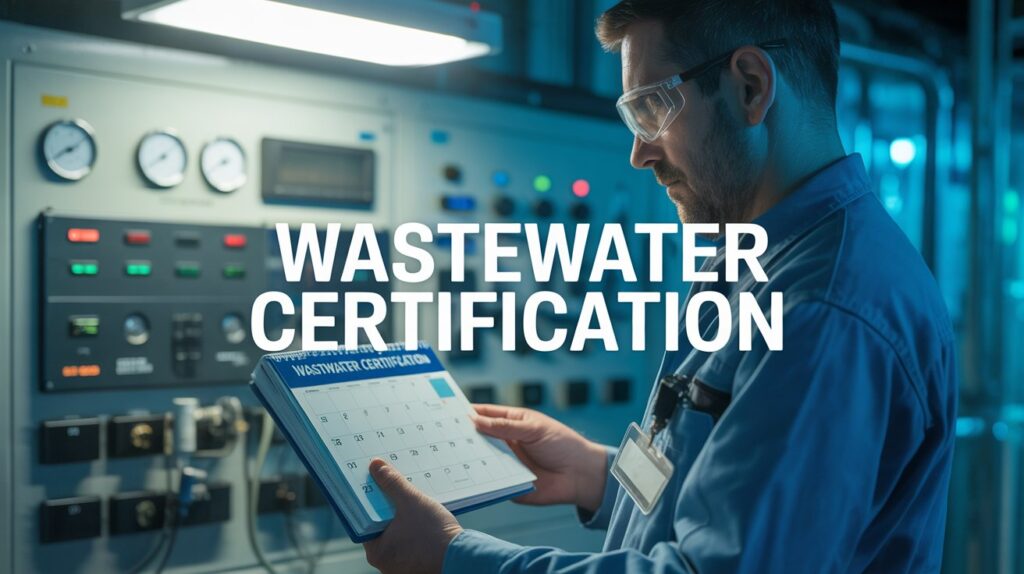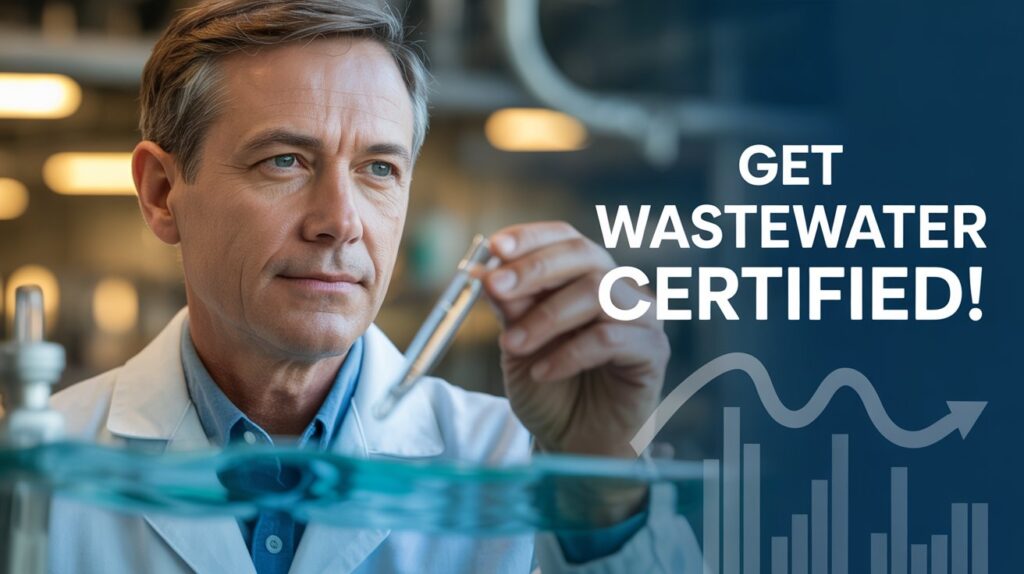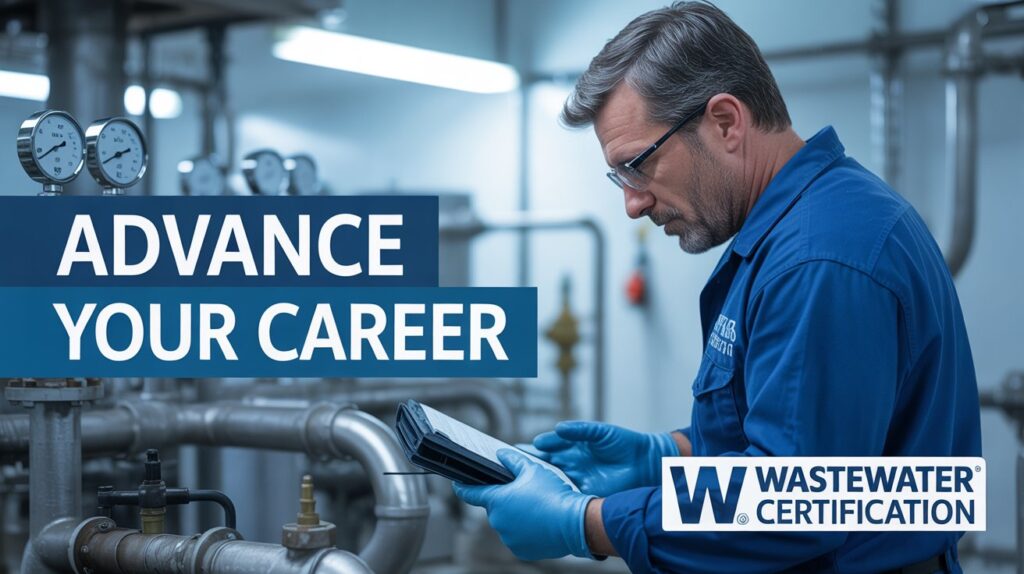Are you considering a career in wastewater treatment but unsure about the certification process and its duration? Understanding the time it takes to become certified is crucial for planning your career path effectively.

The journey to obtaining a wastewater certification involves several steps, including education, training, and examination. The certification requirements can vary significantly based on the level of certification you’re aiming for, from entry-level to advanced certifications.
Key Takeaways
- Understanding the certification timeline is crucial for career planning.
- The certification process involves education, training, and examination.
- Certification levels range from entry-level to advanced, each with different requirements.
- The time required for certification varies based on the level and state-specific requirements.
- Proper planning can help you navigate the certification process efficiently.
Understanding Wastewater Certification Basics
Wastewater certification is not a one-size-fits-all process; it includes multiple levels and specializations. The certification system is designed to validate an operator’s knowledge, skills, and abilities in managing wastewater systems effectively.
Types of Wastewater Certifications Available
There are various types of wastewater certifications available, catering to different aspects of wastewater management. These include Biological Wastewater Treatment, Physical/Chemical Wastewater Treatment, and Collection Systems, among others. Certification levels range from D/4 (entry-level) to A/1 (the highest level of professional qualification). Each certification type focuses on specific skills required for different roles in wastewater treatment.
Why Certification Matters in the Industry
Certification is crucial in the wastewater industry as it ensures that operators have the necessary expertise to manage systems that protect public health and the environment. Certified operators typically enjoy better job prospects, higher salaries, and greater job security. The table below highlights the benefits of certification:
| Certification Level | Job Prospects | Salary Range |
|---|---|---|
| Entry-Level (D/4) | Basic maintenance and operation | $40,000 – $60,000 |
| Advanced (A/1) | Leadership and complex system management | $80,000 – $100,000 |
As emphasized by industry experts, “Certification is a critical step in ensuring that wastewater operators have the necessary skills to manage complex treatment systems effectively.”
How Long Does It Take to Get a Wastewater Certification?
The process of getting certified in wastewater treatment involves multiple factors that influence the overall duration. To become a certified wastewater operator, one must complete the required training, gain relevant experience, and pass a certification exam.
Average Timeline Overview
The typical timeline for obtaining wastewater certification varies significantly based on the level of certification sought. For instance, entry-level certifications, such as D/Class 4, can be achieved within 2-6 months, including training and exam preparation. In contrast, advanced certifications like A/Class 1 require 5-8 years of progressive experience and education.
Factors That Affect Certification Timeline
Several key factors influence the certification timeline, including educational background, relevant work experience, and the availability of required training courses. For example, applicants with a high school diploma or GED can substitute up to two years of experience with college hours or additional TCEQ-approved wastewater operator training. Specifically, 32 semester hours of college or 40 additional hours of approved training can replace one year of work experience.
Other factors such as application processing times, exam scheduling, and state-specific requirements also play a crucial role. Some states offer accelerated paths through education substitutions, potentially shortening the certification timeline. Personal factors like study time dedication and exam preparation effectiveness further impact the overall duration.
Education Requirements and Timeframes
Educational background plays a pivotal role in determining the timeframe for achieving wastewater certification. The level of education attained can significantly influence the amount of hands-on experience required and the overall certification timeline.
High School Diploma or GED Path
For most wastewater certification programs, a high school diploma or GED serves as the minimum educational requirement, providing the foundation for entry-level certification. Candidates with only a high school diploma or GED typically face a longer certification timeline, requiring more extensive hands-on experience. For instance, achieving top-level certifications can take up to 8 years, compared to 4-5 years for those with higher education qualifications. Specialized training courses can help reduce this timeframe by substituting for some of the required experience.
College Degree Advantages
A college degree in relevant fields such as environmental science, engineering, or biology can substantially accelerate the certification process. Bachelor’s degree holders can qualify for advanced certifications in half the time (2.5-5 years) compared to those with only a high school education. Some states offer education-experience substitution formulas, where college credits can replace work experience, further streamlining the certification timeline. By investing in higher education, individuals can not only shorten their certification timeframe but also secure higher starting positions within wastewater treatment facilities.
Experience Requirements by Certification Level
The level of experience needed for wastewater certification varies significantly across different certification levels. As one progresses from entry-level to more advanced certifications, the requirements for hands-on experience increase substantially.
Entry-Level Certifications (D Level)
Entry-level or D-level certifications typically require minimal or no experience, making them accessible to newcomers in the wastewater field. Most states allow operators to obtain this certification after completing a 20-40 hour Basic Wastewater Operation course and passing the corresponding examination.
Mid-Level Certifications (C and B Levels)
Mid-level certifications, such as C and B levels, demand more experience. For instance, C-level certifications generally require 2 years of hands-on operational experience in wastewater treatment facilities, along with specialized training courses. B-level certifications require 3-5 years of progressive experience, with at least half directly related to wastewater treatment operations.
Advanced Certifications (A Level)
Advanced A-level certifications demand the most extensive experience, typically 4-8 years depending on the education level, with requirements for supervisory experience in many states. The experience requirements are often tiered based on education level, with master’s degree holders needing approximately 4 years of experience, bachelor’s degree holders needing 5 years, and high school graduates needing 8 years.

It’s also important to note that experience must be documented and verified by current certified operators or supervisors, which can add time to the application process if employment verification is delayed.
Application and Examination Process
Understanding the application and examination process is crucial for those seeking wastewater certification. The process begins with submitting a completed certification application form to the state regulatory agency.
Application Processing Time
The application processing time varies significantly by state, ranging from 2-4 weeks in efficient states to 8-12 weeks in states with larger backlogs. Most states charge application fees between $50-150, depending on the certification level.
| Certification Level | Application Fee | Exam Fee |
|---|---|---|
| Operator Level ‘E’ through ‘A’ | $50-150 | $136 |
| Well Driller | $50-150 | $99 |
Exam Scheduling and Preparation
Once an application is approved, candidates receive an authorization letter to schedule their certification exam. Exam scheduling adds another 1-4 weeks, depending on test center availability. Wastewater certification exams typically consist of 50-100 multiple-choice questions, covering treatment processes, mathematics, and regulations. Candidates should prepare thoroughly, as the exams are challenging.
State-by-State Timeline Variations
The timeline for obtaining wastewater certification varies significantly from state to state. This variation is due to differences in regulatory frameworks, staffing levels at certification boards, and specific requirements for each certification level.

Fast-Track States
Some states, such as Texas, Florida, and Nevada, are considered fast-track states. They typically process applications within 2-4 weeks and offer frequent examination opportunities, allowing operators to progress through certification levels more quickly. These states often feature online application systems and computer-based testing available multiple days per week.
States with Longer Processing Times
In contrast, states like California, New York, and some New England states may take 8-12 weeks to review applications. This is often due to more stringent requirements or understaffed certification boards. Some states require board approval meetings that only occur quarterly, which can add months to the certification timeline if application submission deadlines are missed.
Accelerating Your Certification Timeline
Accelerating your wastewater certification timeline requires strategic planning and leveraging available resources. By understanding the various factors that influence certification timelines, wastewater treatment professionals can expedite their career advancement.
Education Substitutions for Experience
One effective way to accelerate certification is by substituting education for experience. For instance, applicants with a High School diploma or GED may substitute up to two years of experience with college hours or additional TCEQ approved wastewater operator training. Specifically, 32 semester hours of college or 40 additional hours of approved training can be equivalent to one year of work experience.
| Education Level | Equivalent Experience |
|---|---|
| 32 semester hours of college | 1 year of work experience |
| 16 semester hours of college | 6 months of work experience |
| 40 hours of approved training | 6 months of work experience |
Strategic Exam Preparation
Strategic exam preparation is another crucial aspect of accelerating certification. Using state-specific study materials, practice tests, and focused review of mathematical calculations can significantly increase first-time pass rates, thus avoiding retesting delays. Some states also offer provisional or operator-in-training certifications that allow candidates to begin accumulating experience credit while completing education requirements.
Key Strategies for Acceleration:
- Pursue relevant associate’s or bachelor’s degrees while working in entry-level positions.
- Take additional approved training courses beyond the minimum requirements.
- Work at facilities that offer diverse treatment processes.
- Maintain detailed documentation of all work duties, training courses, and continuing education credits.
Conclusion
Navigating the process of obtaining wastewater certification requires a clear understanding of the various factors that influence the overall timeline. The timeframe for certification varies significantly based on the level sought, ranging from a few months for entry-level certifications to several years for advanced levels.
Education and training play a crucial role in accelerating the certification process. By investing in relevant degrees or additional training courses, individuals can substantially reduce the time needed to achieve higher certification levels. Moreover, understanding state-specific requirements is essential, as these can significantly impact the overall timeline.
The wastewater treatment industry offers a clear career progression path through certification levels, with each step bringing increased responsibility and compensation. While the certification process requires a significant time investment, the benefits of career stability, advancement opportunities, and the importance of protecting public health and the environment make it a worthwhile professional path.